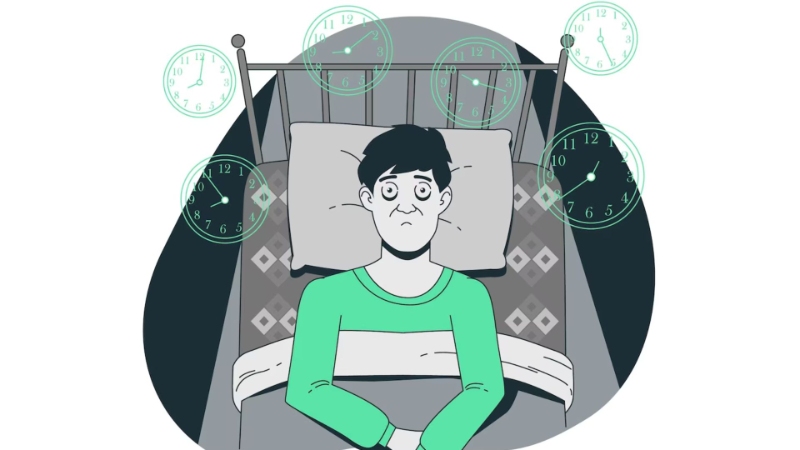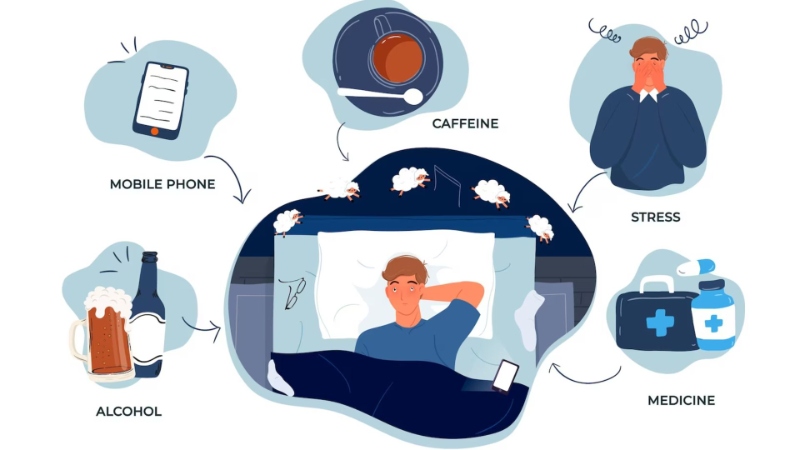Last updated on May 20th, 2025 at 10:10 am

Homeopathic Medicine for Insomnia: Insomnia is a common sleep disorder characterized by difficulty falling asleep, staying asleep, or both. It can result in poor sleep quality, leaving individuals feeling tired, irritable, and unrefreshed during the day. The causes of insomnia vary and can include stress, anxiety, depression, medical conditions, medications, and lifestyle factors. Understanding the specific causes and symptoms of insomnia is essential for finding the most effective treatment options.
Insomnia symptoms can vary between individuals but often include difficulty falling asleep, frequent waking during the night, waking up too early in the morning, and not feeling refreshed after sleep. Daytime symptoms may include fatigue, difficulty concentrating, irritability, and an increased risk of accidents or errors at work. Chronic insomnia can lead to more severe health problems, such as obesity, diabetes, heart disease, and a weakened immune system.
Insomnia affects people of all ages, genders, and backgrounds, but it tends to be more prevalent in older adults, women, and those with chronic medical conditions. Insomnia can be classified as acute (short-term) or chronic (long-term), with acute insomnia often resulting from temporary stressors, while chronic insomnia may have more deep-rooted causes.
Conventional Treatments for Insomnia
Conventional treatment options for insomnia typically focus on addressing the underlying causes of the sleep disorder, such as stress or medical conditions, and using medications to help improve sleep quality. Doctors often prescribe prescription medications, such as benzodiazepines and non-benzodiazepine sedative-hypnotics, to help individuals fall asleep and stay asleep throughout the night. However, these medications can have side effects, including dependence, drowsiness, and memory problems.
People may also use over-the-counter sleep aids, such as antihistamines and melatonin, to help alleviate insomnia symptoms. While effective for some, these medications can cause side effects like dizziness, dry mouth, and daytime drowsiness in others. Furthermore, long-term use of sleep aids can lead to dependence and may not address the underlying causes of insomnia.
Cognitive-behavioural therapy (CBT) for insomnia is another conventional treatment option that focuses on addressing the thoughts and behaviours contributing to sleep problems. CBT for insomnia can help individuals establish healthy sleep habits, identify and change unhelpful thoughts about sleep, and learn relaxation techniques to help them fall asleep more easily. While CBT for insomnia can be effective, it may not be suitable for everyone, especially those with more severe sleep disorders or medical conditions.
Best Homeopathic Medicine for Sleep
Homeopathic medicine offers an alternative treatment option for those seeking relief from insomnia symptoms without the potential side effects associated with conventional medications. Homeopathy is a holistic system of medicine that aims to stimulate the body’s natural healing processes by using highly diluted substances derived from plants, minerals, and animal products. According to the fundamental tenet of homeopathy, “like cures like,” a chemical that can create symptoms in a healthy person can also treat those same symptoms in a sick person.
Homeopathic medicine for insomnia focuses on addressing the root causes of the sleep disorder, such as stress, anxiety, or hormonal imbalances, and aims to restore balance within the body to promote a good night’s sleep. Homeopathic practitioners select remedies based on the specific symptoms and characteristics of each individual, making it a personalized and tailored treatment option.
Top 10 Homeopathic Medicine for Insomnia
1. Coffea Cruda
Homeopaths derive this remedy from unroasted coffee beans and often use it to treat insomnia caused by an overactive mind, racing thoughts, or excessive mental activity. Coffea Cruda may help those who frequently wake at night and struggle to fall back asleep.
2. Aconitum Napellus
3. Nux Vomica
Doctors often use this homeopathic remedy derived from the seeds of the Strychnos nux-vomica tree to treat insomnia caused by overindulgence in stimulants, such as caffeine, alcohol, or nicotine. Nux Vomica may also be helpful for those who have difficulty falling asleep due to an overactive mind or work-related stress.
4. Passiflora Incarnata
Also known as passionflower, Passiflora Incarnata is a homeopathic remedy that has sedative and calming properties. Doctors often use it to treat insomnia related to anxiety, restlessness, or nervous exhaustion.
5. Ignatia Amara
St. Ignatius bean seeds produce Ignatia Amara, a homeopathic remedy often used to treat insomnia related to grief, emotional stress, or depression. This remedy may be particularly helpful for those who experience frequent waking, vivid dreams, or difficulty falling asleep due to a racing mind.
6. Arsenicum Album
7. Pulsatilla Nigricans
Derived from the windflower plant, Pulsatilla Nigricans is a homoeopathic remedy often used to treat insomnia related to hormonal imbalances or emotional stress. This remedy may be particularly helpful for women, as it can help to address the causes of insomnia in females, such as premenstrual syndrome (PMS) or menopause.
8. Calcarea Carbonica
Also known as calcium carbonate, Calcarea Carbonica is a homeopathic remedy often used to treat insomnia related to physical exhaustion or overwork. This remedy can be particularly helpful for those who have difficulty falling asleep, wake frequently during the night, or experience sleepwalking.
9. Lycopodium Clavatum
Homeopaths often use Lycopodium Clavatum, derived from the club moss plant, to treat insomnia related to digestive issues or liver problems. This remedy may be particularly helpful for those who experience bloating, indigestion, or gas that contributes to their sleep problems.
10. Silicea
Also known as silicon dioxide, Silicea is a homeopathic remedy often used to treat insomnia related to anxiety or nervousness. This remedy may be particularly helpful for those who experience difficulty falling asleep due to an overactive mind or fear of the dark.

Best Homeopathy Medicine for Anxiety and Sleeplessness
When using homoeopathic medicines for insomnia, it is essential to follow the guidance of a qualified homoeopath or healthcare professional. Patients typically take homoeopathic remedies in the form of small pellets or tablets that dissolve under the tongue. The dosage and frequency of use will vary depending on the specific remedy and the individual’s needs. To ensure optimal absorption, avoid eating or drinking for at least 15 minutes before and after taking homeopathic remedies
Homeopathic medicines are generally considered safe and have few side effects, but it is important to consult with a healthcare professional if you are pregnant, nursing, or taking any prescription medications. Additionally, if your insomnia symptoms persist or worsen, it is essential to consult a healthcare professional.
Consult a Doctor and Medkart will help you Order Medicines Online
Home Remedies for Insomnia: Lifestyle Changes to Improve Sleep
In addition to using homoeopathic medicine for insomnia, there are various home remedies and lifestyle changes that can help improve sleep quality. These may include:
- Establishing a regular sleep schedule that includes going to bed and rising at the same time each day, including on the weekends.
- Creating a relaxing bedtime routine that includes activities such as reading, listening to calming music, or taking a warm bath.
- Limiting exposure to screens, such as phones, tablets, and televisions, at least one hour before bedtime.
- Ensuring your sleep environment is comfortable, quiet, and dark, with a comfortable mattress and pillows.
- Limiting caffeine, alcohol, and nicotine intake, especially in the hours leading up to bedtime.
- Incorporating regular exercise into your daily routine, but avoiding vigorous activity close to bedtime.
- Practicing relaxation techniques, such as deep breathing, progressive muscle relaxation, or meditation, helps calm the mind and body before sleep.

Causes of Insomnia in Females: Understanding Gender-Specific Factors
While insomnia can affect individuals of all genders, some gender-specific factors may contribute to the development of insomnia in females. These factors can include hormonal fluctuations, such as those experienced during menstruation, pregnancy, and menopause, which can disrupt sleep patterns and contribute to insomnia. Additionally, women may be more prone to stress, anxiety, and depression, which are known causes of insomnia.
Understanding the specific causes of insomnia in females is crucial for identifying effective treatment options. Studies have shown that homoeopathic remedies, such as Pulsatilla Nigricans, can help address hormonal imbalances and emotional stressors that can lead to insomnia in women. Additionally, incorporating lifestyle changes, such as relaxation techniques and regular exercise, can help to reduce stress levels and promote better sleep quality.
Home Remedies for Homeopathic Medicine for Insomnia
While homeopathic medicine and home remedies can be effective in treating insomnia, combining these approaches may offer the most significant benefit. For example, incorporating relaxation techniques, such as meditation or deep breathing, alongside homeopathic remedies, such as Coffea Cruda or Ignatia Amara, can help to calm the mind and promote better sleep quality.
Additionally, incorporating lifestyle changes, such as establishing a regular sleep schedule and creating a relaxing bedtime routine, can help support the body’s natural sleep-wake cycle and promote better sleep quality.
Insomnia the Enemy of Sleep Reading Answers: What Science Tells Us
In recent years, there has been an increasing amount of research into the causes and treatment of insomnia. One area of research has focused on the impact of technology on sleep quality. Studies have shown that exposure to blue light emitted by electronic devices, such as smartphones and tablets, can disrupt the body’s natural sleep-wake cycle and lead to difficulty falling asleep.
Other research has explored the relationship between diet and sleep quality. Studies have shown that a diet high in sugar and processed foods can lead to poor sleep quality, while a diet rich in whole foods, such as fruits, vegetables, and lean protein, can promote better sleep quality.
Additionally, research has shown that mindfulness practices, such as meditation and yoga, can help to reduce stress and anxiety levels, leading to better sleep quality. These practices can also help to improve overall mental health and well-being.
Read: What are Generic Medicines?
Conclusion
Insomnia can be frustrating and exhausting, but a variety of natural solutions are available to help promote better sleep quality. Homeopathic medicine offers a personalized and tailored approach to treating insomnia, while lifestyle changes, such as relaxation techniques and regular exercise, can help to support overall sleep health. By working with a qualified healthcare professional and exploring a range of treatment options, individuals can find the best solution for their insomnia and achieve a good night’s sleep.
FAQs on Homeopathy Medicine for Sleep
1. What is homeopathy and how does it approach treating sleeplessness or insomnia?
Homeopathy is holistic medicine system that treats the underlying causes of health issues by stimulating the body’s natural healing mechanisms. Homeopathy focuses on identifying the individual’s unique symptoms and prescribing remedies that match those symptoms in the case of sleeplessness or insomnia.
2. What are some common symptoms that might lead to the selection of a homeopathic medicine for sleeplessness?
Homeopathic remedies are chosen based on a person’s specific symptoms, which can include restlessness, anxiety, racing thoughts, difficulty falling asleep, waking up frequently during the night, and exhaustion despite lack of sleep.
3. Can you provide an example of a homeopathic remedy that is often recommended for sleeplessness and its corresponding symptoms?
Coffea cruda, a homeopathic remedy derived from coffee, is used for sleeplessness caused by an overactive and restless mind. The person might experience heightened sensitivity and alertness, and their thoughts might be racing.
4. How does a person take homeopathic medicines for sleeplessness?
Homeopathic medicines are typically available in the form of small pellets or liquid solutions. They should be taken under the tongue or dissolved in a small amount of water. The frequency of dosing and potency will be determined by a qualified homeopathic practitioner based on the individual’s symptoms.
5. Are there any potential side effects or interactions to be aware of when using homeopathic medicines for sleeplessness?
When used as directed, people generally consider homeopathic medicines safe because they are highly diluted substances, which reduces the risk of side effects. However, it’s important to consult with a qualified homeopathic practitioner before using any remedy, especially if you are already taking other medications or have underlying health conditions.
Related Links :
